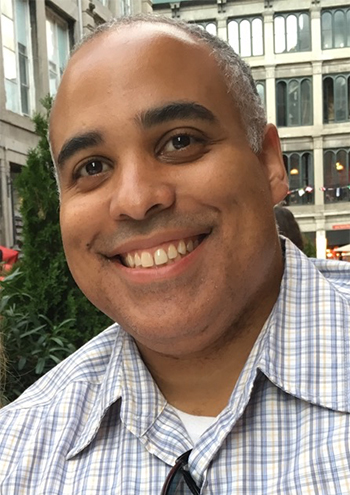ŌĆ£We often lump groups together when there is a lot of diversity within those groups.ŌĆØ
 Jason Chatman, a psychologist and faculty member in the Department of Psychology and Neuroscience, is speaking about the tendency for broader society to perceive people of African descent, as well as other minority populations, as members of a single homogenous group.
Jason Chatman, a psychologist and faculty member in the Department of Psychology and Neuroscience, is speaking about the tendency for broader society to perceive people of African descent, as well as other minority populations, as members of a single homogenous group.
As Dr. Chatman points out, this lens isnŌĆÖt merely reductive ŌĆö itŌĆÖs simply not true.
ŌĆ£Nova Scotia has the oldest population of black people in Canada,ŌĆØ he says. ŌĆ£ItŌĆÖs old but itŌĆÖs also very diverse, because thereŌĆÖve been these waves of people of African descent who have moved to Nova Scotia.
ŌĆ£Paying homage to that is important.ŌĆØ
Sharing stories
Paying homage to the variety of identities within the African-Canadian communities is Dr. ChatmanŌĆÖs motivation for sharing his own perspective at African People in Halifax: Embracing Our Diversity, an event hosted by the Black Student Advising Centre (BSAC) on Tuesday, February 7, in room 307 of the ╗Ų╔½ų▒▓ź Student Union Building. He is one of three speakers who will tell stories about their individual identities and the impact these identities have had on their lives.
As a biracial man, Dr. Chatman will speak to how his connection to two ethnic heritages has often left him feeling disconnected from both.
ŌĆ£Being biracial, you kind of grow up outside of these two groups and youŌĆÖre never really a part of one or the other,ŌĆØ says Dr. Chatman, who grew up in a small Ontario town with his mother, who is white. ŌĆ£I think because of that there were some unique challengesŌĆØ.
ŌĆ£I had teachers who would touch my hair and would always be very interested in my hair. And they werenŌĆÖt touching anyone elseŌĆÖs hair but mine. My mom, despite her great efforts, really just wasnŌĆÖt equipped to deal with some of those things.ŌĆØ
Dr. Chatman describes his relationship to his biracial identity as an evolving process. ŌĆ£Growing up, I identified as black. ThatŌĆÖs the way society saw me and to a large extent thatŌĆÖs how I saw myself. It wasnŌĆÖt until we had another Black student in my class who was not biracial that I had to start to make some changes in how I viewed myself, because my ŌĆśblacknessŌĆÖ came into question by people.
ŌĆ£I was ŌĆśblackŌĆÖ until Dwayne showed up,ŌĆØ laughs Dr. Chatman. ŌĆ£And then people were like, ŌĆśwhatŌĆÖs going on? Are you still black?ŌĆÖŌĆØ
Context and history
In addition to telling stories about searching for his identity in the confusion of adolescence, Dr. Chatman also plans to discuss biracial history in contexts ranging from slavery to interracial relationships to his own work as a psychologist.
ŌĆ£In my work, I meet a lot of youth who struggle with their identity because they have not had any contact with their black relatives,ŌĆØ says Dr. Chatman, who was able to maintain a connection with his father as he grew up.
ŌĆ£During adolescence, we all try to figure out our place in the world, our identity. If youŌĆÖre biracial thatŌĆÖs quite difficult because youŌĆÖve got all these different elements of your identity, but when you look at the media or you look at history, thereŌĆÖs very little about us.ŌĆØ
Dr. Chatman will be joined by fellow speakers Robert Wright, a social worker and member of HalifaxŌĆÖs LGBTQ+ community, and artist Tyler Simmonds, who will discuss his battles with depression and anxiety.
ŌĆ£Talking about identity is not what we usually talk about as Black people in general, so I felt that this was an opportunity to do that,ŌĆØ says Oluronke Taiwo,┬Ā the director of the Black Student Advising Centre┬Ā┬Ā and the organizer of TuesdayŌĆÖs event.
ŌĆ£I hope our audience will take away that itŌĆÖs okay to be proud of whatever identity you belong to, whether youŌĆÖre black or biracial or LGBTQ+ or going through a mental health situation, and that they will leave with strategies to more fully embrace diversity as African people.ŌĆØ
"African People In Halifax: Embracing Our Diversity" takes place Tuesday, February 7 at 6 p.m. in room 307 of the Student Union Building. For more African Heritage Month activities in February, visit Dal's African Heritage Month webpage.
